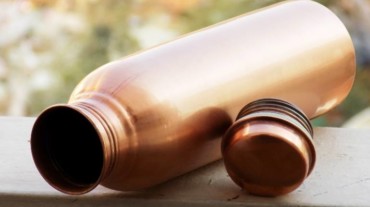
Disposable plastic bottles are easily available and are convenient to carry. But drinking water from such bottles might mean that you are letting thousands of potentially toxic tiny plastic particles pass through your body. A new study has revealed that on average, one liter of bottled water consists of 2,40,000 plastic bits that are detectable. These are known as nanoplastics, which may be harmful to your health. Since there are so many health risks of plastic bottles, you might want to consider switching to metal water bottles to stay hydrated and safe.
The study on plastic bottles was published earlier this month in the Proceedings of the National Academy of Sciences journal. Researchers noted that microplastics and nanoplastics have raised health concerns, with nanoplastics believed to be more toxic. That’s because their smaller size makes them much more amenable, in comparison to microplastics, to enter our body.
Drinking from plastic bottles may pose health risks due to potential exposure to microplastics, says general physician Dr Sanjay Kumar. However, more studies need to be done on the harmful effects of nanoplastics on your health, but it is better to avoid plastic bottles.

Here are the health risks of plastic bottles you should know about:
Plastic bottles may release microplastics into the water, which can be ingested and accumulate in the body over time. These particles may lead to various health issues, as they carry harmful chemicals.
Plastic bottles can leach harmful chemicals, such as BPA (bisphenol A), into the water. BPA is known to disrupt hormonal balance and has been linked to reproductive issues and developmental problems, says the expert.
Plastics can absorb environmental toxins, and when consumed, these toxins may negatively impact health. Long-term exposure to such contaminants can contribute to chronic health conditions such as cardiovascular diseases, respiratory issues, neurological disorders, and metabolic disorders.
Certain chemicals found in plastics, such as phthalates and styrene, are potential carcinogens. They may contribute to the development of various cancers, including breast cancer, prostate cancer, and cancers related to the reproductive system. The mechanisms involve the disruption of hormonal balance and cellular processes, increasing the likelihood of cancerous growth, explains the expert.
Now that you know that there are many health risks of using plastic bottles, you might want to switch to metal water bottles. They are generally made of stainless steel and copper and considered safer alternatives than plastic bottles.
Here are some benefits of using copper water bottles:
Select Topics of your interest and let us customize your feed.
PERSONALISE NOW
But you should use it in moderation due to copper toxicity. Excessive copper intake can lead to nausea and vomiting, says Dr Kumar. Copper may also react with acidic drinks, potentially compromising its safety.
Here are some benefits of stainless steel water bottles:
Stainless steel water bottles are generally considered the safest option. They are non-reactive and do not leach harmful substances into the contents. But look for bottles labeled as “food-grade” stainless steel to ensure the highest safety standards.
Before you buy a metal water bottle, make sure you keep the following points in mind:
Always consider individual preferences, needs, and health conditions while choosing a water bottle.
Get Latest Updates on Health News